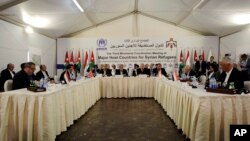GENEVA —
A senior United Nations official says international support for Jordan is needed to head off growing resentment against Syrian refugees. He warns competition between the refugees and host communities for scarce resources is causing strains.
Nearly 600,000 Syrian refugees have fled to Jordan to escape fighting in their country. Only 20 percent of them live in camps where United Nations and private aid agencies provide them with care and assistance. The other 80 percent are living in host communities.
They rely on basic government subsidies and on basic social services. This is putting enormous pressure on the infrastructure of the country. The U.N. resident humanitarian coordinator for Jordan, Edward Kallon, says there is an urgent need for development investment in Jordan to sustain the humanitarian investment.
He says the Syrian refugee and Jordanian communities live together. They are intertwined. He says it is not possible for the U.N. to provide aid only to the Syrians.
“A hungry Syrian child or a Jordanian child is a hungry child," he said. "There is no way how we are going to discriminate. … We should try to enhance social cohesion rather than creating sensitivities that result in resentment, which is not going to help our total humanitarian effort in Jordan.”
Kallon says the situation in Syria is not getting better and refugees will be living in Jordan for a very long time. He says the international community must come to the table and share the burden assumed by Jordan and other countries of asylum.
Humanitarian needs are increasing at a time when the money to support aid efforts is decreasing. He adds that only 26 percent of the U.N. appeal for $4.2 billion this year has been funded - and nearly half the year has gone by.
The humanitarian coordinator says Jordan is developing a "national resilience plan" to help the government cope with an overwhelming refugee situation. He tells VOA that Jordan aims to strengthen the country’s infrastructure, which has become seriously strained under the impact of the refugees.
“These include water, sanitation, health, municipal services and, to some extent, also the security costs that are involved in maintaining the peace and stability that is required in this context.”
Kallon says Jordan's development project will cost another $4.2 billion, but that since it is a Jordanian initiative, the government in Amman will appeal for contributions.
Nearly 600,000 Syrian refugees have fled to Jordan to escape fighting in their country. Only 20 percent of them live in camps where United Nations and private aid agencies provide them with care and assistance. The other 80 percent are living in host communities.
They rely on basic government subsidies and on basic social services. This is putting enormous pressure on the infrastructure of the country. The U.N. resident humanitarian coordinator for Jordan, Edward Kallon, says there is an urgent need for development investment in Jordan to sustain the humanitarian investment.
He says the Syrian refugee and Jordanian communities live together. They are intertwined. He says it is not possible for the U.N. to provide aid only to the Syrians.
“A hungry Syrian child or a Jordanian child is a hungry child," he said. "There is no way how we are going to discriminate. … We should try to enhance social cohesion rather than creating sensitivities that result in resentment, which is not going to help our total humanitarian effort in Jordan.”
Kallon says the situation in Syria is not getting better and refugees will be living in Jordan for a very long time. He says the international community must come to the table and share the burden assumed by Jordan and other countries of asylum.
Humanitarian needs are increasing at a time when the money to support aid efforts is decreasing. He adds that only 26 percent of the U.N. appeal for $4.2 billion this year has been funded - and nearly half the year has gone by.
The humanitarian coordinator says Jordan is developing a "national resilience plan" to help the government cope with an overwhelming refugee situation. He tells VOA that Jordan aims to strengthen the country’s infrastructure, which has become seriously strained under the impact of the refugees.
“These include water, sanitation, health, municipal services and, to some extent, also the security costs that are involved in maintaining the peace and stability that is required in this context.”
Kallon says Jordan's development project will cost another $4.2 billion, but that since it is a Jordanian initiative, the government in Amman will appeal for contributions.




